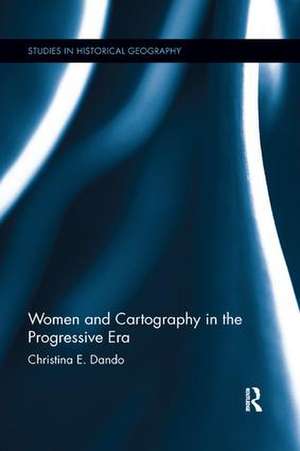Women and Cartography in the Progressive Era: Studies in Historical Geography
Autor Christina E. Dandoen Limba Engleză Paperback – 5 mar 2019
Long overlooked, this women’s work represents maps and mapping that today we would term community or participatory mapping, critical cartography and public geography. These historic examples of women-generated mapping represent the adoption of cartography and geography as part of women’s work. While cartography and map use are not new, the adoption and application of this technology and form of communication in women’s work and in multiple examples in the context of their social work, is unprecedented.
This study explores the implications of women’s use of this technology in creating and presenting information and knowledge and wielding it to their own ends. This pioneering and original book will be essential reading for those working in Geography, Gender Studies, Women’s Studies, Politics and History.
| Toate formatele și edițiile | Preț | Express |
|---|---|---|
| Paperback (1) | 390.76 lei 43-57 zile | |
| Taylor & Francis – 5 mar 2019 | 390.76 lei 43-57 zile | |
| Hardback (1) | 1002.63 lei 43-57 zile | |
| Taylor & Francis – 24 aug 2017 | 1002.63 lei 43-57 zile |
Preț: 390.76 lei
Nou
Puncte Express: 586
Preț estimativ în valută:
74.77€ • 78.28$ • 61.87£
74.77€ • 78.28$ • 61.87£
Carte tipărită la comandă
Livrare economică 07-21 aprilie
Preluare comenzi: 021 569.72.76
Specificații
ISBN-13: 9780367245306
ISBN-10: 0367245302
Pagini: 224
Dimensiuni: 156 x 234 x 14 mm
Greutate: 0.49 kg
Ediția:1
Editura: Taylor & Francis
Colecția Routledge
Seria Studies in Historical Geography
Locul publicării:Oxford, United Kingdom
ISBN-10: 0367245302
Pagini: 224
Dimensiuni: 156 x 234 x 14 mm
Greutate: 0.49 kg
Ediția:1
Editura: Taylor & Francis
Colecția Routledge
Seria Studies in Historical Geography
Locul publicării:Oxford, United Kingdom
Cuprins
1. The Power and the Pleasure 2. Women, Geographic Knowledge, and Mobility 3. "Woman’s Work" Part I – American Women Missionary Geographies 4. "Woman’s Work" Part II – Hull-House and Social Settlement Work 5. Changing the Map – Political Activism, Geography, and Cartography 6. Maps in Motion, Women in Motion
Notă biografică
Christina E. Dando is Professor of Geography at the University of Nebraska Omaha. She received her B.A. in Geography and English from the University of North Dakota and her M.S. and Ph.D.s in Geography from the University of Wisconsin-Madison. Her research interests include the impacts of media and technology on human perception and interaction with the environment, particularly the Great Plains. She is also interested in gender and geography, how landscape and environment have long been gendered as well as how gender impacts human experience and interaction with the environment. She is a member of the American Association of Geographers and of the Society of Woman Geographers. When not researching and writing, she enjoys exploring new landscapes and reading for sheer pleasure.
Recenzii
"Maps have long been used by those in power, traditionally men, to show strength and ownership, to shape thought and to embody nationalism. Here, Dando shows American women in the Progressive Era using the power of maps to further causes important to them: education, the preservation of historic features, social uplift and equality. This book is an important addition…Dando has made fresh contributions to scholarship on the ‘new woman’, not least by drawing attention to the importance of the intersection of geography, mapping and the social-settlement movement."- Mylynka Kilgore Cardona, Texas A&M University—Commerce Commerce, Texas
Descriere
Capturing the untold and numerous ways in which women and maps interacted during the Progressive Era (1890-1930), this book uses three historical examples from North America to argue that maps were essential for women not only to find their way in the world but also to construct and communicate their own world views.






